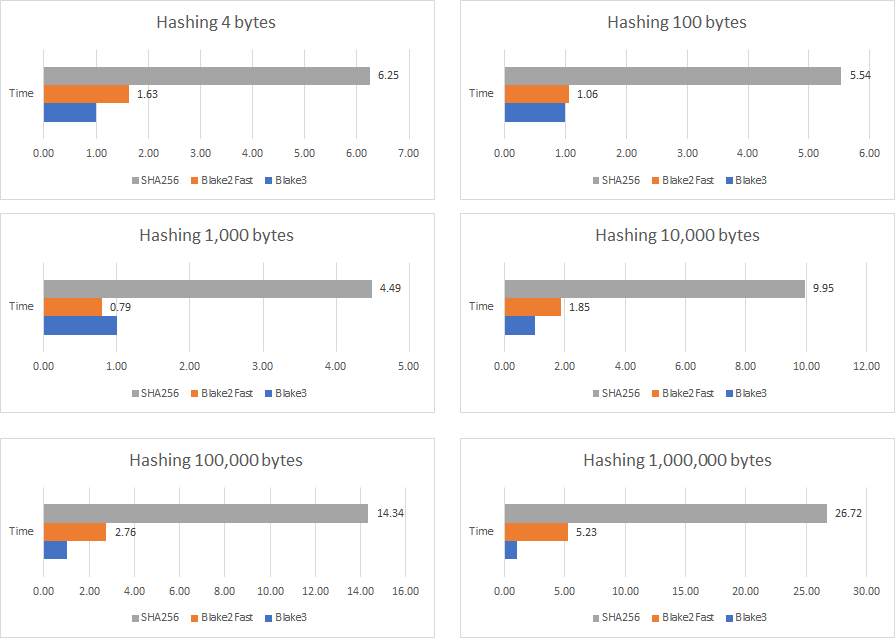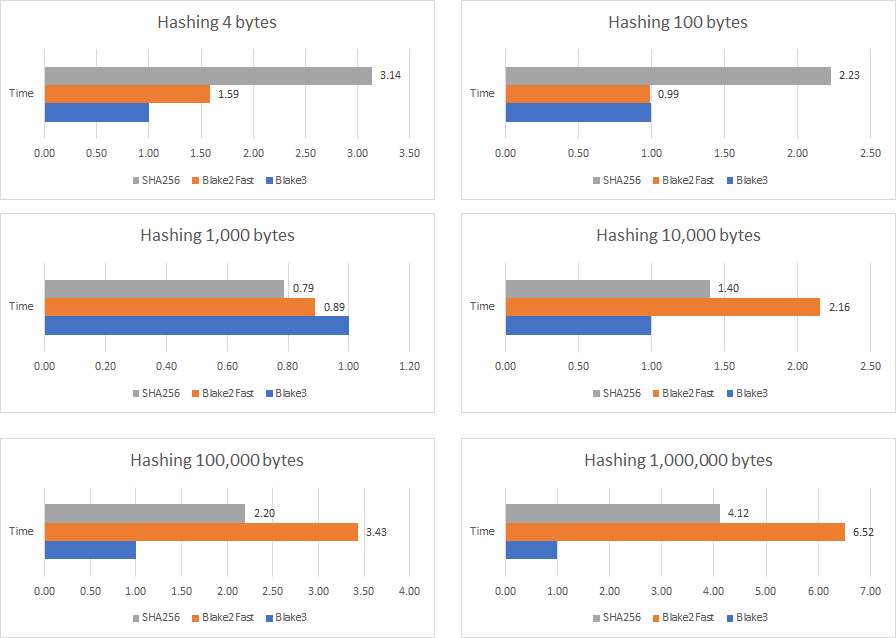Blake3.NET is a fast managed wrapper around the SIMD Rust implementations of the BLAKE3 cryptographic hash function.
The current native version of BLAKE3 used by Blake3.NET is
1.5.5
- Compatible with .NET7.0+.
- Fast interop with
Spanfriendly API. - API similar to the Blake3 Rust API.
- CPU SIMD Hardware accelerated with dynamic CPU feature detection.
- Multiple platforms supported.
- Incremental update API via
Hasher. - Support for multi-threading hashing via
Hasher.UpdateWithJoin.
Hash a buffer directly:
var hash = Blake3.Hasher.Hash(Encoding.UTF8.GetBytes("BLAKE3"));
Console.WriteLine(hash);
// Prints f890484173e516bfd935ef3d22b912dc9738de38743993cfedf2c9473b3216a4Or use the Hasher struct for incremental updates:
// Hasher is a disposable struct!
using var hasher = Blake3.Hasher.New();
hasher.Update(Encoding.UTF8.GetBytes("BLAKE3"));
var hash = hasher.Finalize();Or seek in the output "stream" to any position:
using var hasher = Blake3.Hasher.New();
hasher.Update(Encoding.UTF8.GetBytes("BLAKE3"));
var hashAtPosition = new byte[1024];
var hash = hasher.Finalize(4242, hashAtPosition);Or hash a stream on the go with Blake3Stream:
using var blake3Stream = new Blake3Stream(new MemoryStream());
blake3Stream.Write(Encoding.UTF8.GetBytes("BLAKE3"));
var hash = blake3Stream.ComputeHash();Or produce a message authentication code using a 256-bit key:
using var blake3 = Hasher.NewKeyed(macKey);
blake3.UpdateWithJoin(message);
var tag = blake3.Finalize();
byte[] authenticationTag = tag.AsSpan().ToArray();Or derive a subkey from a master key:
const string context = "[application] [commit timestamp] [purpose]";
using var blake3 = Hasher.NewDeriveKey(Encoding.UTF8.GetBytes(context));
blake3.Update(inputKeyingMaterial);
var derivedKey = blake3.Finalize();
byte[] subkey = derivedKey.AsSpan().ToArray();Blake3.NET is supported on the following platforms:
win-x64,win-x86,win-arm64,win-armlinux-x64,linux-arm64,linux-armosx-x64,osx-arm64
The benchmarks are running with BenchmarkDotNet .NET 5.0 and done on multiple different sizes compared with the following implementations:
- Blake3.NET (Blake3 Native Version:
0.3.7) - Blake2Fast
2.0.0 System.Security.Cryptography.SHA256of .NET 5.0
For the 1,000,000 bytes test, Blake3 is using the multi-threading version provided by Blake3 (Hasher.UpdateWithJoin method).
Results
- In general, Blake3 is much faster than SHA256 which is depending on whether your CPU supports Intel SHA Extensions.
- Blake3 can be from 2x to 10x times faster than SHA256
- The multi-threading version can give a significant boost if the data to hash is big enough
- Blake3 is usually working best on large input.
The CPU before Intel Ice Lake or AMD Zen don't have the Intel SHA CPU extensions.
In that case, Blake3 is around 5x to 10x times faster than the built-in SHA256.
The following benchmark was ran on an Intel Core i7-4980HQ CPU 2.80GHz (Haswell):
BenchmarkDotNet=v0.12.1, OS=Windows 10.0.18363.1139 (1909/November2018Update/19H2)
Intel Core i7-4980HQ CPU 2.80GHz (Haswell), 1 CPU, 8 logical and 4 physical cores
.NET Core SDK=5.0.100
[Host] : .NET Core 5.0 (CoreCLR 5.0.20.51904, CoreFX 5.0.20.51904), X64 RyuJIT
DefaultJob : .NET Core 5.0.0 (CoreCLR 5.0.20.51904, CoreFX 5.0.20.51904), X64 RyuJIT
| Method | N | Mean | Error | StdDev | Median |
|---|---|---|---|---|---|
| Blake3 | 4 | 85.06 ns | 1.704 ns | 2.154 ns | 83.55 ns |
| Blake2Fast | 4 | 138.30 ns | 0.755 ns | 0.670 ns | 138.36 ns |
| SHA256 | 4 | 531.82 ns | 0.842 ns | 0.788 ns | 531.85 ns |
| Blake3 | 100 | 145.12 ns | 2.899 ns | 4.064 ns | 142.56 ns |
| Blake2Fast | 100 | 153.41 ns | 3.057 ns | 4.760 ns | 150.66 ns |
| SHA256 | 100 | 803.32 ns | 11.420 ns | 8.916 ns | 797.37 ns |
| Blake3 | 1000 | 999.01 ns | 19.658 ns | 26.908 ns | 984.60 ns |
| Blake2Fast | 1000 | 789.41 ns | 15.814 ns | 18.825 ns | 784.82 ns |
| SHA256 | 1000 | 4,489.81 ns | 84.032 ns | 78.603 ns | 4,525.27 ns |
| Blake3 | 10000 | 4,099.92 ns | 49.985 ns | 46.756 ns | 4,121.94 ns |
| Blake2Fast | 10000 | 7,593.55 ns | 127.193 ns | 112.753 ns | 7,609.07 ns |
| SHA256 | 10000 | 40,799.82 ns | 769.102 ns | 1,386.850 ns | 41,460.32 ns |
| Blake3 | 100000 | 28,491.58 ns | 394.692 ns | 369.195 ns | 28,498.05 ns |
| Blake2Fast | 100000 | 78,732.84 ns | 648.124 ns | 606.255 ns | 78,887.56 ns |
| SHA256 | 100000 | 408,581.45 ns | 2,359.416 ns | 2,207.000 ns | 409,059.91 ns |
| Blake3 | 1000000 | 138,481.22 ns | 1,300.797 ns | 1,216.767 ns | 138,460.16 ns |
| Blake2Fast | 1000000 | 724,092.30 ns | 6,995.547 ns | 6,543.639 ns | 720,115.33 ns |
| SHA256 | 1000000 | 3,699,812.03 ns | 37,739.460 ns | 35,301.514 ns | 3,678,276.17 ns |
If your CPU has Intel SHA CPU extensions, then Blake3 is on average ~2x times faster than SHA256.
The following benchmarks was ran on a AMD Ryzen 9 3900X:
BenchmarkDotNet=v0.12.1, OS=Windows 10.0.19041.630 (2004/?/20H1)
AMD Ryzen 9 3900X, 1 CPU, 24 logical and 12 physical cores
.NET Core SDK=5.0.100
[Host] : .NET Core 5.0 (CoreCLR 5.0.20.51904, CoreFX 5.0.20.51904), X64 RyuJIT
DefaultJob : .NET Core 5.0.0 (CoreCLR 5.0.20.51904, CoreFX 5.0.20.51904), X64 RyuJIT
| Method | N | Mean | Error | StdDev |
|---|---|---|---|---|
| Blake3 | 4 | 77.86 ns | 0.332 ns | 0.310 ns |
| Blake2Fast | 4 | 123.57 ns | 0.939 ns | 0.879 ns |
| SHA256 | 4 | 244.31 ns | 1.157 ns | 1.082 ns |
| Blake3 | 100 | 125.60 ns | 0.497 ns | 0.440 ns |
| Blake2Fast | 100 | 124.48 ns | 1.053 ns | 0.985 ns |
| SHA256 | 100 | 279.82 ns | 1.853 ns | 1.734 ns |
| Blake3 | 1000 | 888.90 ns | 0.873 ns | 0.681 ns |
| Blake2Fast | 1000 | 790.85 ns | 4.364 ns | 3.645 ns |
| SHA256 | 1000 | 700.81 ns | 2.078 ns | 1.842 ns |
| Blake3 | 10000 | 3,508.37 ns | 23.411 ns | 21.899 ns |
| Blake2Fast | 10000 | 7,569.91 ns | 40.661 ns | 38.034 ns |
| SHA256 | 10000 | 4,922.90 ns | 14.360 ns | 13.432 ns |
| Blake3 | 100000 | 22,109.48 ns | 47.699 ns | 39.830 ns |
| Blake2Fast | 100000 | 75,937.97 ns | 223.972 ns | 209.503 ns |
| SHA256 | 100000 | 48,655.78 ns | 102.273 ns | 95.666 ns |
| Blake3 | 1000000 | 117,936.94 ns | 263.454 ns | 246.435 ns |
| Blake2Fast | 1000000 | 768,752.03 ns | 1,836.783 ns | 1,718.128 ns |
| SHA256 | 1000000 | 485,944.26 ns | 1,326.657 ns | 1,240.956 ns |
You need to install the .NET 7 SDK or latest Visual Studio 2022. Then from the root folder:
$ dotnet build src -c ReleaseIn order to rebuild the native binaries, you need to run the build scripts from lib/blake3_dotnet
This software is released under the BSD-Clause 2 license.
Alexandre Mutel aka xoofx.



